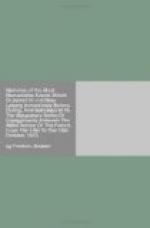order, though nobody could conceive what was the meaning
of all this, while the cannon were yet thundering
before the city. We soon learned that the allies
had sustained a total defeat; that an Austrian prince,
the archduke Ferdinand, had lost an arm, and been
taken prisoner with 40,000 men; and that an immense
quantity of artillery had been captured. This
intelligence had been forwarded by marshal Ney from
the field of battle, and preparations were instantly
made to celebrate the victory. A regiment of
the French guards marched to the promenade before the
city—now, alas! an offensive sewer,—and,
agreeably to command, expressed their exultation in
the acquisition of these new laurels by a loud
Vive
l’empereur! Of the citizens, but a very small
portion took part in their joy; for what else could
they have expected from such a victory than inevitable
death by famine? The more intelligent shook their
heads; and in truth there were but too many reasons
to suspect the truth of the account. If you asked
the wounded, who in troops either hobbled or were
carried in at the gates, the answer, was,
Les Cossaques
ont encore la meme position—(The Cossacks
are still in the same position). None of them
had heard any thing about captured cannon, but they
well knew that they had themselves lost five pieces
that morning. I was unable to comprehend how
the French commander-in-chief, possessing in so eminent
a degree the quality of a correct military
coup
d’oeil, could so early announce that he
had won the battle, when such numerous armies of the
allies had but just arrived upon the field, and had
not yet fired a single shot. Country-people,
who had fled from the neighbourhood of Grimma, declared
that a fresh army of Russians, under general Bennigsen,
was in full march towards that place. In truth,
only a small part of the allied forces had yet been
engaged. Bennigsen, the crown-prince of Sweden,
and field-marshal Bluecher, had not yet entered the
lists. If this fiction was intended merely to
pacify our king at the expense of truth, it was evident
that this object could not be attained without compromising
him;—a kind of treatment wholly unmerited
by a prince who was never guilty of wilful falsehood[4].
In the midst of these rejoicings for the victory,
the thunder of the artillery was again heard from
Lindenau. The tremendous roar was almost immediately
repeated from Taucha, Wiederitsch, and Breitenfeld.
The Swedish army and that of Bluecher were now engaged.
We again repaired to our lofty station. There
was not a point round the city where the fatal engines
were not dealing forth destruction. We knew not
which way first to direct the glass. “Only
look here,” cried one. “Oh! that’s
nothing at all,” replied another, “you
must come this way.”—“You none
of you see any thing,” exclaimed a third:
“you must look yonder—there the cavalry
are cutting away—and hark how the fresh
artillery is beginning to fire.” It was




